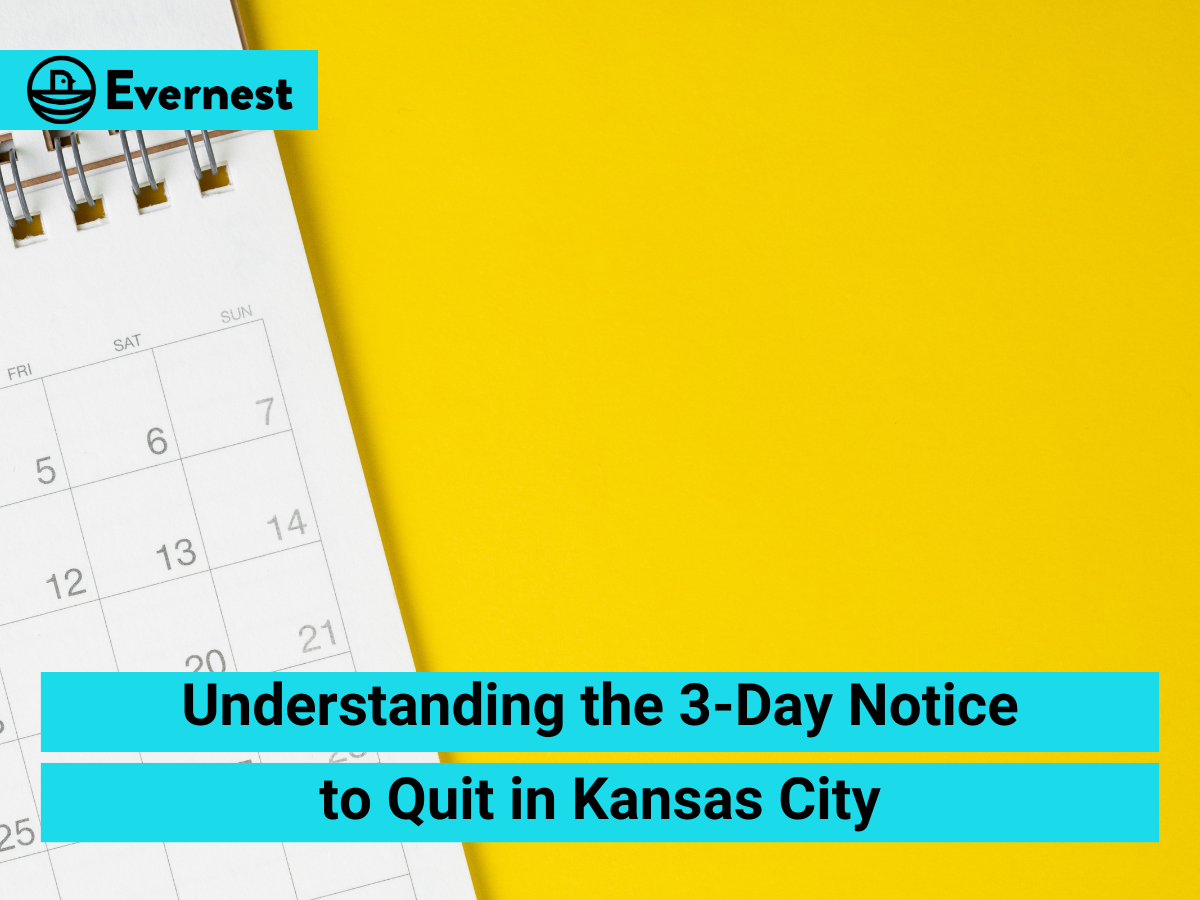The 3-Day Notice to Quit is an important legal document that landlords use in Kansas City to initiate the eviction process. It serves as a formal notice to tenants who have violated the terms of their lease agreement or failed to pay rent on time. As a landlord, it is important to understand the ins and outs in order to follow through with a lawful and enforceable eviction. This article will explain the legal basis for the 3-Day Notice, the components it should include, and the rights and responsibilities of both landlords and tenants during the eviction process in Kansas City.
Understanding the 3-Day Notice to Quit
The 3-Day Notice to Quit is a specific type of eviction notice that landlords serve to tenants when there is a lease agreement violation or non-payment of rent. This notice provides tenants with a period of three days to either rectify the violation or vacate the premises. Failure to comply with the notice within the specified time frame enables the landlord to pursue legal action for eviction.
Legal Basis for the 3-Day Notice
The legal basis for issuing a 3-Day Notice to Quit in Kansas City is primarily governed by Missouri's landlord tenant laws. According to these laws, landlords have the right to terminate a tenancy and obtain possession of their property if the tenant breaches the lease agreement or fails to pay rent as agreed upon.
Additionally, landlords must ensure that the notice is served in accordance with the specific requirements set forth by Kansas City laws. Proper service of the notice ensures that tenants have been given adequate time and an opportunity to address the violation before eviction proceedings begin.
When Can a Landlord Issue a 3-Day Notice?
Landlords can issue a 3-Day Notice to Quit under various circumstances. Some common reasons for serving this notice include:
Non-payment of rent
Violation of lease terms
Engaging in illegal activities on the premises
Causing damage to the property
It's important for landlords to understand the specific grounds for eviction as outlined in the lease agreement and Kansas City laws. This ensures that the notice is issued only in situations that warrant eviction.
Pro tip: Don’t overlook good legal representation in these situations! A knowledgeable real estate attorney can help you determine the best path forward.
Components of a 3-Day Notice to Quit
In order for a 3-Day Notice to Quit to be legally valid, it must include essential information and be delivered properly to the tenant. Here are some components that should be included in the notice:
Essential Information to Include
The notice should clearly state the landlord's name and contact information, the tenant's name(s), the property address, and the reason for the notice. Additionally, it should mention that the tenant has three days from the date of the notice to resolve the issue or vacate the premises.
Proper Delivery Methods
Acceptable methods of delivery include personal delivery to the tenant, posting the notice on the front door of the property, or sending it via certified mail. It is important to keep a record of the delivery for legal purposes.
Tenant's Rights and Obligations
Tenants who receive a 3-Day Notice to Quit should be aware of their rights and obligations in response to the notice.
Responding to a 3-Day Notice to Quit
Upon receiving the notice, tenants should carefully review the stated violation and assess its validity. If the violation is accurate, tenants should take immediate action to remedy the situation within the three-day timeframe.
If tenants believe that the notice is unjust or that they have been wrongfully accused, they have the option to challenge the notice in court. Seeking legal advice and representation can assist tenants in navigating the eviction process and defending their rights.
Legal Options Available for Tenants
Tenants facing eviction have several legal options available in Kansas City. They can request a hearing in court to present their case, attempt to negotiate a settlement with the landlord, or explore mediation services to resolve the dispute amicably. It's important for tenants to understand their rights and consult with legal professionals who specialize in landlord-tenant disputes.
Landlord's Rights and Responsibilities
While landlords have the right to initiate the eviction process through a 3-Day Notice to Quit, they also have important responsibilities to fulfill.
Following the Legal Process
Landlords must ensure that they follow the legal process when issuing a 3-Day Notice to Quit. This includes adhering to proper notice requirements, delivering the notice in an appropriate manner, and allowing the tenant the specified three-day period to comply or vacate the premises.
Failure to comply with these legal requirements may result in the dismissal of the eviction case or potential liability for the landlord. Therefore, it is essential for landlords to seek legal guidance and fully understand the eviction process in Kansas City.
Dealing with Non-compliance from Tenants
If a tenant fails to comply with the 3-Day Notice to Quit within the specified time frame, landlords can proceed with legal action to evict the tenant. This typically involves filing an eviction lawsuit in court and attending a hearing to present the case.
It's important for landlords to consult with legal professionals who specialize in landlord-tenant law to ensure their rights are protected throughout the eviction process. They should also be prepared to provide evidence of the lease violation or non-payment of rent to support their case.
Note that working with a professional property management company with expertise in lawful eviction can help you ensure compliance with local regulations.
Eviction Process Post 3-Day Notice
Once the three-day period outlined in the 3-Day Notice to Quit has expired and the tenant has not resolved the violation or vacated the premises, landlords can proceed with the eviction process.
Court Proceedings and Judgments
Landlords will need to file an eviction lawsuit in the appropriate court in Kansas City. This initiates the legal process, which may involve attending a hearing, presenting evidence, and obtaining a judgment for possession of the property.
Execution of Eviction
Once the court has issued a judgment in favor of the landlord, they can seek assistance from law enforcement to carry out the eviction. The process of physically removing the tenant from the premises is usually coordinated with the local sheriff's office or a court-appointed officer.It's important for landlords to exercise caution and empathy during the eviction process to avoid any potential legal repercussions or conflicts with tenants.
Conclusion
The 3-Day Notice to Quit is a critical step in the eviction process in Kansas City. Understanding the legal basis, components, and rights and obligations of both landlords and tenants is crucial for a smooth eviction process. By following the appropriate legal procedures and seeking professional guidance, landlords and tenants can navigate the eviction process effectively and protect their rights and interests.
Looking for a property management company in Kansas City? Reach out to our local team today!


